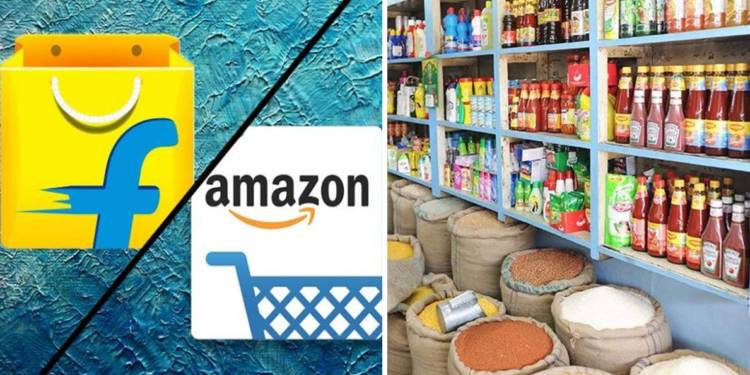Since the announcement of Coronavirus induced lockdown, the local Kirana stores have kept our lifeline running. Had it not been the sophisticated network of Kirana stores, which not only supply products but also extend credit to known people during difficult times, millions of people would have been forced to sleep without a two-time meal.
The government has noticed the herculean effort made by Kirana stores and is willing to extend policy support. Last month, when the announcement of second phase lockdown was made, the government shocked e-commerce companies by not allowing them to extend the delivery to non-essential items.
In the third phase, the government announced that e-commerce companies would sale only essential items in Red Zone areas. These companies interpreted it as a green signal for delivery of all goods in Orange and Green zone areas, but The Confederation of All India Traders (CAIT) – the powerful body which represents more than a crore small shop owners- said that the e-commerce companies are deliberately misinterpreting the government order to fool local authorities and no business for these companies is allowed in orange and green zones.
Whatever be the interpretation, the government action in the last few months has made it very clear that it is willing to support the local market than e-commerce and supermarkets.
A few weeks ago, Principal Economic Advisor Sanjeev Sanyal, who is among the influential members of the Modi government when it comes to economic policymaking, tweeted in support of local market shops.
“One of the backbones of the #Covid19 lockdown is India’s Kirana-shop network. They have not merely kept 1.3bn people supplied despite many difficulties, they extend localized credit, provide doorstep delivery, and source products for specific needs. An incredible effort”, tweeted Sanyal.
He also argued for modernization of these shops for the 21st century. “This Kirana-shop network is not merely an important part of our economic system but is part of our social capital. It should not be allowed to be dissolved by impersonal mega-chains. We need to clean up local market places & modernize them for the 21st century,” he wrote.
One of the backbones of the #Covid19 lockdown is India's Kirana-shop network. They have not merely kept 1.3bn people supplied despite many difficulties, they extend localized credit, provide doorstep delivery, and source products for specific needs. An incredible effort.
— Sanjeev Sanyal (@sanjeevsanyal) April 18, 2020
Another influential BJP personality who actively supports the cause of local traders and Kirana stores is Dr Subramanian Swamy. “We should back our traders on the Flipkart/ Amazon issue. When we can access Amazon of USA through credit cards what is the need to allow Amazon in India? Traders are a solid base of our culture and Amazon will destroy that. Same problem with Walmart,” tweeted Swamy. Dr Swamy regularly supports the cause of CAIT speaks about this on public forums and twitter.
We should back our traders on the Flipkart/ Amazon issue. When we can access Amazon of USA through credit cards what is the need to allow Amazon in India? Traders are a solid base of our culture and Amazon will destroy that. Same problem with Walmart
— Subramanian Swamy (@Swamy39) October 21, 2019
Union Commerce minister Piyush Goyal has also spoken against Amazon, which regularly flouts the norms of third party platform between seller and buyer by opening its own retail stores and selling at a heavy discount, thus hurting the business of local shopowners. Amazon is infamous for predatory pricing- offering impossibly high rates of discount, sometimes below the cost price, throwing competing retailers out of business.
Last year, speaking at an event in New Delhi, Piyush Goyal said, “They [Amazon] may have put in a billion dollars but if they make a loss of a billion dollars every year, then jolly well will have to finance that billion-dollar. So, it is not as if they are doing a favour to India when they invest a billion dollars.”
It is very evident that the government is willing to pay back to the local stores for being frontline warriors against Coronavirus.
Given the fact the major e-commerce players in India- Amazon and Flipkart- are foreign-owned entities, the government would rather support Jiomart, which aims to support local shops in its e-commerce model. Jiomart has already begun testing in Mumbai and is planning to launch the service very soon with the help of newly inked deal with Facebook which would allow it to use Whatsapp pay and penetrate to rural markets.
One can contest the unfair policies of the government towards existing e-commerce companies but the government allowed them to operate for such a long time despite the fact they openly flouted the norms by opening their own retail stores was itself wrong in the first place. The government is just correcting its mistakes by supporting the Kirana stores and local shops in the market.






















